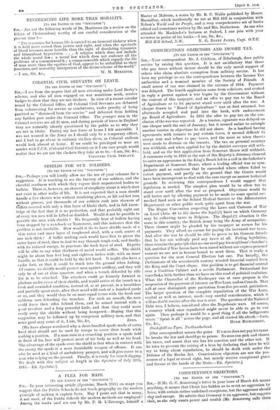CONSCIENTIOUS OBJECTORS AND INCOME TAX.
[To THE EDITOR OF THE " SPECTATOR.") Sin,—Your correspondent Mr. J. Crichton, of Edinburgh, does public service by raising this question. It is not satisfactory that those who pay taxes without demur should be the only moral support of others who claim absolute exemption from military service. It has been my privilege to see the correspondence between the Income Tax authorities and a nominal member of the Society of Friends. A small arrear of tax was claimed in the autumn of 1914. Payment was delayed. The fourth application came from solicitors, and evoked in reply a protest against a war begun by the Government without the consent of this taxpayer, and an offer to pay tax to the Board of Agriculture or to let payment stand over until after the war. A cheque drawn to "Board of Agriculture" was at first returned, but afterwards accepted and paid into the bank, with endorsement pp. Board of Agriculture. In 1915 the offer to pay tax on the con- clusion of the war was repeated. As a trustee, signature was delayed on one cheque until the end of January, but it seemed unfair to entangle another trustee in objections he did not share. As a landlord having agreements with tenants to pay certain taxes, it seemed difficult to accept rent and refuse to pay taxes, and the more so when threats were made to distrain on the tenants. The tax on personal earnings was withheld, and when applied for by the district surveyor still with- held, and on the first application from Somerset House still withheld. A summons early in 1916 at the suit of His Majesty's Attorney-General to enter an appearance in the King's Bench led to a call in the Solicitor's Department at Somerset House, where a leading official was so sym- pathetic and so courteous that he succeeded where others failed to extort payment, and partly on the ground that the Courts would have been incompetent to deal with the case except on narrow technical grounds. In reviewing this correspondence I would suggest that legislation is needed. The simplest plan would be to allow tax to stand over until after the war as proposed. Objections would be still better met by allowing payment to be made to some special ear- marked fund such as the School Medical Service or the Afforestation Department or other public work quite apart from the war.
The Hague Convention respecting the Laws and Customs of War on Land (Arts. 48 to 51) shows the legal (1) basis on which Germany may be collecting taxes in Belgium. The illegal () situation is the same in this country. the British Army being the Army of occupation. These clauses might be pleaded by the taxpayer as excuse for his payments. They afford no excuse for paying the increased war taxes. And after the war he should be able to prove to his German friend.; that he has not willingly paid any taxes at all. Failing legislation, there remains the principle that no one need pay his neighbour's butcher's bill, and that if War Loans have been raised without our express personal consent we are not in honour bound to meet them. That is really a question for the next General Election but one. Put broadly, Oa Parliaments of the seventeenth century wrested financial control from the King and the Court clique. Our problem is to get financial control over a Coalition Cabinet and a servile Parliament. Switzerland has travelled, a little further than we have on this road of political evolution. What the Chancellor of the Exchequer can at once propose is the suspension of the payment of interest on War Loan and on Consols. That will at once distinguish pure patriotism from five-per-cent. patriotism. The larger question of the complete repudiation of the War Loan, capital as well as interest, needs very careful consideration, which it will no doubt receive after the war is over. The question of the National Debt was, I believe, considered after the Napoleonic wars. Of course, a country which once repudiated might never be able to go to war again. Then perhaps it would be a good thing if all the belligerents wrote "Spent it all" across the page, and all started life afresh.—I am, [Our correspondent misses the point If a man does not pay his taxes he breaks the law and should go to prison. No man can pick and choose his taxes, and assert that one has his sanction and the other not. If he tries to prevent the raising of a loan by declaring that later he will try to bring about repudiation, he should be dealt with under the Defence of the Realm Act. Conscientious objectors are not the pos- sessors of a legal or moral right, but merely receive exceptional graco and favour at the hands of the State.—En. Spectator.]


































 Previous page
Previous page